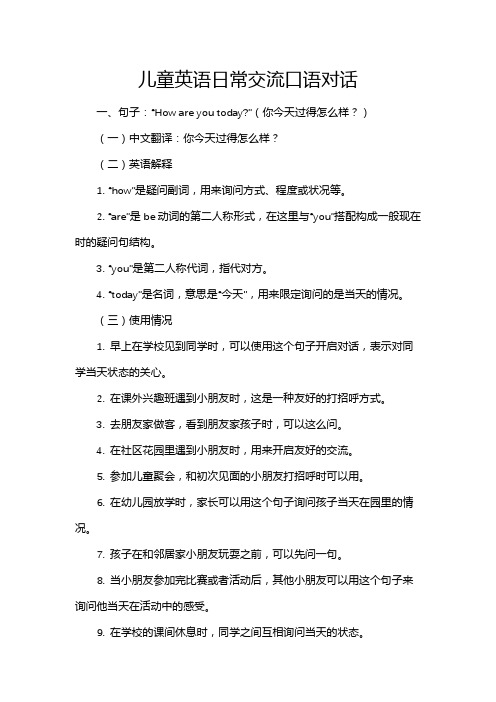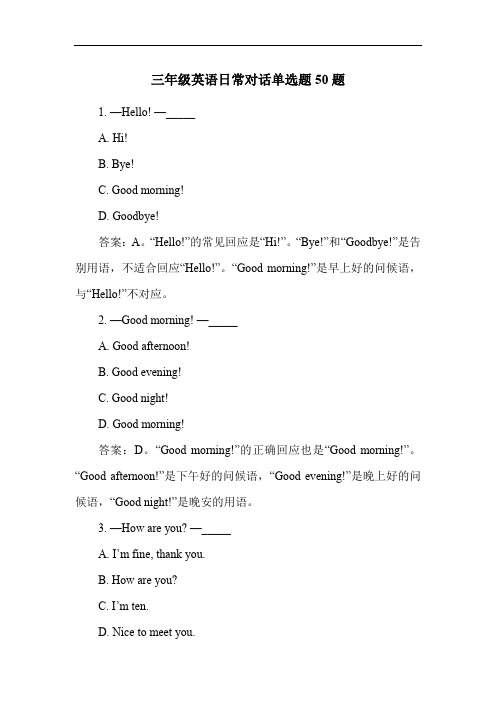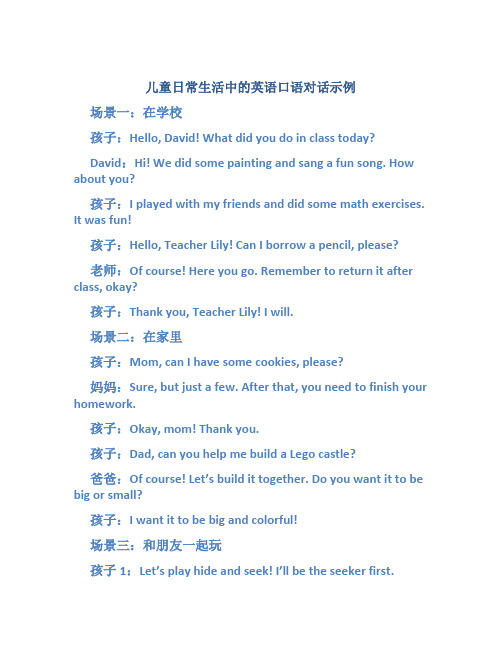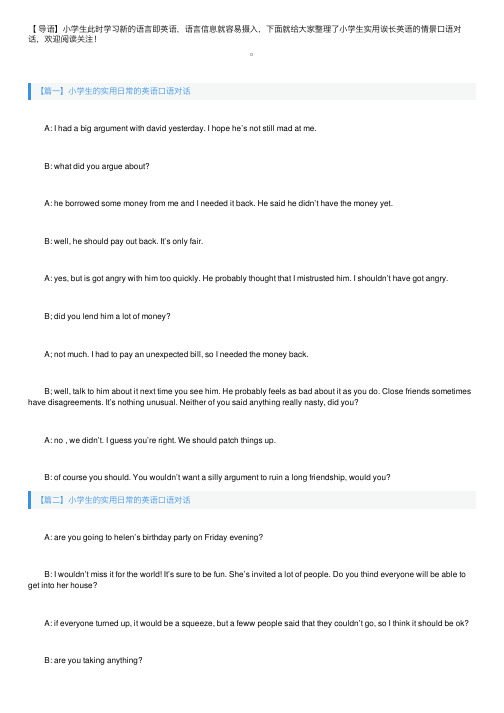常用儿童日常英语对话
儿童日常交流英语口语大全

儿童日常交流英语口语大全问候与介绍1.Hello! How are you?2.Hi! What’s your name?3.Good morning! How are you today?4.Hi! Nice to meet you.日常生活用语5.What do you want to eat for breakfast?6.I want to play outside.7.Can I have a cookie?8.I need to go to the bathroom.9.Let’s clean up our toys.学校用语10.What is your favorite subject?11.Do you have any homework tonight?12.Can you help me with my math?13.Let’s play on the playground.家庭与周末14.What do you want to do this weekend?15.I love spending time with my family.16.Can we have a movie night?情绪表达17.I’m hap py today!18.I’m sad because I lost my toy.19.I’m excited for my birthday party.20.I’m tired and need to rest.游戏与娱乐21.Let’s play hide and seek.22.I want to color a picture.23.Can we have a tea party?24.Let’s build a fort with blankets.总结以上是一些儿童日常生活中常用的英语口语,希望能帮助孩子们更好地进行日常交流。
学习英语口语可以让孩子们更好地融入国际化的学习和交流环境中,提升他们的语言能力和交流能力。
儿童英语日常交流口语对话

儿童英语日常交流口语对话一、句子:“How are you today?”(你今天过得怎么样?)(一)中文翻译:你今天过得怎么样?(二)英语解释1. “how”是疑问副词,用来询问方式、程度或状况等。
2. “are”是be动词的第二人称形式,在这里与“you”搭配构成一般现在时的疑问句结构。
3. “you”是第二人称代词,指代对方。
4. “today”是名词,意思是“今天”,用来限定询问的是当天的情况。
(三)使用情况1. 早上在学校见到同学时,可以使用这个句子开启对话,表示对同学当天状态的关心。
2. 在课外兴趣班遇到小朋友时,这是一种友好的打招呼方式。
3. 去朋友家做客,看到朋友家孩子时,可以这么问。
4. 在社区花园里遇到小朋友时,用来开启友好的交流。
5. 参加儿童聚会,和初次见面的小朋友打招呼时可以用。
6. 在幼儿园放学时,家长可以用这个句子询问孩子当天在园里的情况。
7. 孩子在和邻居家小朋友玩耍之前,可以先问一句。
8. 当小朋友参加完比赛或者活动后,其他小朋友可以用这个句子来询问他当天在活动中的感受。
9. 在学校的课间休息时,同学之间互相询问当天的状态。
10. 当小老师(例如在角色扮演中)与“学生”互动时,小老师可以这么问。
二、句子:“What's your name?”(你叫什么名字?)(一)中文翻译:你叫什么名字?(二)英语解释1. “what's”是“what is”的缩写形式,“what”是疑问代词,用来询问事物或人的名称等。
2. “your”是形容词性物主代词,用来表示所属关系,在这里指“你的”。
3. “name”是名词,意思是“名字”。
(三)使用情况1. 在新的儿童活动小组里,小朋友们初次见面时可以互相问这个问题。
2. 幼儿园新入学时,小朋友之间会用这个句子互相认识。
3. 在儿童游乐场所,小朋友结识新朋友时会这么问。
4. 参加亲子活动,孩子与其他家庭的孩子初次交流时。
三年级英语日常对话单选题50题

三年级英语日常对话单选题50题1. —Hello! —_____A. Hi!B. Bye!C. Good morning!D. Goodbye!答案:A。
“Hello!”的常见回应是“Hi!”。
“Bye!”和“Goodbye!”是告别用语,不适合回应“Hello!”。
“Good morning!”是早上好的问候语,与“Hello!”不对应。
2. —Good morning! —_____A. Good afternoon!B. Good evening!C. Good night!D. Good morning!答案:D。
“Good morning!”的正确回应也是“Good morning!”。
“Good afternoon!”是下午好的问候语,“Good evening!”是晚上好的问候语,“Good night!”是晚安的用语。
3. —How are you? —_____A. I’m fine, thank you.B. How are you?C. I’m ten.D. Nice to meet you.答案:A。
“How are you?”的常见回答是“I’m fine, thank you.”。
“How are you?”不能用来回应“How are you?”本身。
“I’m ten.”是回答年龄的,不适合回应“How are you?”。
“Nice to meet you.”是初次见面时的用语。
4. —Nice to meet you. —_____A. Nice to meet you, too.B. Thank you.C. I’m fine.D. See you.答案:A。
“Nice to meet you.”的正确回应是“Nice to meet you, too.”。
“Thank you.”是表示感谢,“I’m fine.”是回答“How are you?”,“See you.”是告别用语。
幼儿英语启蒙日常对话

幼儿英语启蒙日常对话以下是20个幼儿英语启蒙相关的内容:一、日常对话1. Greeting(问候)- 对话:- Parent: Good morning, baby.- Child: Good morning, mommy/daddy.- 英语释义:“Good morning” is used to say hello in the morning.- 短语:Good morning(早上好)- 单词:morning(早晨,上午,n.)- 用法:用于早上见面时的问候。
- 双语例句:- (英)We say "Good morning" when we meet in the morning.(当我们在早上见面时,我们说“早上好”。
) - (中)每天早上我都会对我的父母说“Good morning”。
2. Asking about feelings(询问感受)- 对话:- Parent: How are you today, sweetie?- Child: I'm fine, thank you.- 英语释义:“How are you” is amon way to ask someone about their well - being.- 短语:How are you(你好吗)- 单词:fine(好的,健康的,adj.)- 用法:用来询问对方的状态。
- 双语例句:- (英)She always asks me "How are you" when we meet.(当我们见面时,她总是问我“你好吗”。
)- (中)当我生病时,妈妈问我“How are you”,我只能说“not so good”。
3. Talking about food(谈论食物)- 对话:- Parent: Do you like apples, baby?- Child: Yes, I like apples. They are sweet.- 英语释义:“Do you like...” is used to ask someone if they have a preference for something.- 短语:like apples(喜欢苹果)- 单词:apple(苹果,n.),sweet(甜的,adj.)- 用法:“like + 名词”表示喜欢某物。
少儿常用英语口语_幼儿日常英语口语对话

少儿常用英语口语_幼儿日常英语口语对话1. Hello! (How do you do?) 你好!2. How are you?-Im fine. Thank you. and you? 你好吗?我很好。
谢谢,你呢?3. Good morning / afternoon/evening/night. 早上好/下午好/晚上好/晚安。
4. Excuse me。
(sorry. Im sorry) 打搅一下(对不起/不好意思)5. Thank you! 谢谢你!6. You are welcome. 不用谢。
7. How are you today? 今天还好吗?8. Nice to meet you. 见到你很高兴。
9. Whats your name? 你叫什么名子啊?10. My name is. 我叫。
11. What can I do for you? 我能为你做点什么?12. Whats wrong with you? (Whatsthe matter?)你怎么了?(出什么事了?)13. Its time for class. 该上课了。
14. Come in please. 请进。
15. Lets get ready for class! 让我们准备上课吧!16. Line up please! 排队!17. Attention please! 立正!18. At ease. 稍息。
19. Turn life/right! 向左/右转!20. One bye one please.no pushing. 一个一个来。
不要挤。
21. Lets go back to the classroom. 让我们回教室去。
感谢您的阅读!。
儿童英语日常交流口语对话怎么写

儿童日常生活中的英语口语对话示例场景一:在学校孩子:Hello, David! What did you do in class today?David:Hi! We did some painting and sang a fun song. How about you?孩子:I played with my friends and did some math exercises. It was fun!孩子:Hello, Teacher Lily! Can I borrow a pencil, please?老师:Of course! Here you go. Remember to return it after class, okay?孩子:Thank you, Teacher Lily! I will.场景二:在家里孩子:Mom, can I have some cookies, please?妈妈:Sure, but just a few. After that, you need to finish your homework.孩子:Okay, mom! Thank you.孩子:Dad, can you help me build a Lego castle?爸爸:Of course! Let’s build it together. Do you want it to be big or small?孩子:I want it to be big and colorful!场景三:和朋友一起玩孩子1:Let’s play hide and seek! I’ll be the seeker first.孩子2:Okay! I’ll hide behi nd the couch. Ready or not, here I come!孩子1:Found you! Now it’s my turn to hide.孩子1:Do you want to play tag or jump rope?孩子2:Let’s play tag first! You’re it, chase me!孩子1:I’m coming to tag you!场景四:在公园孩子:Hi, can I join your game of soccer?孩子2:Yes, we need one more player. Let’s have a fun game together!孩子:Thank you! I love playing soccer.孩子:Mom, can I go on the swings?妈妈:Sure, but be careful and hold on tight. Have fun!孩子:Thank you, mom! Weeeee, I love swinging!通过这些日常生活的对话场景,儿童可以学会如何用简单的英语句子进行交流,提高他们的口语表达能力。
小学生的实用日常的英语口语对话

【导语】⼩学⽣此时学习新的语⾔即英语,语⾔信息就容易摄⼊,下⾯就给⼤家整理了⼩学⽣实⽤诶长英语的情景⼝语对话,欢迎阅读关注!【篇⼀】⼩学⽣的实⽤⽇常的英语⼝语对话 A: I had a big argument with david yesterday. I hope he’s not still mad at me. B: what did you argue about? A: he borrowed some money from me and I needed it back. He said he didn’t have the money yet. B: well, he should pay out back. It’s only fair. A: yes, but is got angry with him too quickly. He probably thought that I mistrusted him. I shouldn’t have got angry. B; did you lend him a lot of money? A; not much. I had to pay an unexpected bill, so I needed the money back. B; well, talk to him about it next time you see him. He probably feels as bad about it as you do. Close friends sometimes have disagreements. It’s nothing unusual. Neither of you said anything really nasty, did you? A: no , we didn’t. I guess you’re right. We should patch things up. B: of course you should. You wouldn’t want a silly argument to ruin a long friendship, would you?【篇⼆】⼩学⽣的实⽤⽇常的英语⼝语对话 A: are you going to helen’s birthday party on Friday evening? B: I wouldn’t miss it for the world! It’s sure to be fun. She’s invited a lot of people. Do you thind everyone will be able to get into her house? A: if everyone turned up, it would be a squeeze, but a feww people said that they couldn’t go, so I think it should be ok? B: are you taking anything? A: I’ve got her a birthday present and I’ll take a bottle fo wine too. B: that’s a good idea. She told she had bought plenty of food and snacks. I think it’s going to be a noisy party. I hope her neihbours don’t mind too much. A: helen gets on very well with her neighours. I wouldn’t be surprised if they went to the party too. B: I’m ready looking forward to it. This party is going to be a blast! A: well, don’t be late. I’ll see you on Friday at helen’s. 住宅与公寓 a: what kind of place shall we rent? b:it should be close to the universtity. neither of us are good at getting up in the morinings and closer it is, the later we can get up. a:asolutely. that's the most important thing to take into consideration. i'm not too worried about the size of the flat. b: neither am i. so a small place is ok, but we'll get a bigger one if it's not expensive. do you mind if it's in a noisy area. a:i don't mind. i'm not a light sleeper, but quieter is better for when we have to study at home. b: good point. ok, let's go to the estate agent and see what they can offer us. a: yes, if we're lucky we'll find something in the next few days. i think you had a good idea to start flat hunting early. b: how much do you think the rent will be? a: i asked a few people who are already living in places near the university and they said it would cost about one hundred pounds a month.【篇三】⼩学⽣的实⽤⽇常的英语⼝语对话 A: I like this apartment. Do you think we can afford the mortgage? B: yes. I think so. It’s not a very expensive apartment. It’s in the right area and it has everything that we are looking for. The rooms are quite large too. A: I love the balcony. We can sit outside and enjoy the sun in summer. We are on the 12th floor, so there’s very nice view from the balcony. B: the neighbourhood is nice too. There is a park nearby. A: yes, and there are many houses nearby. I like it that the neighbourhood isn’t full of apartment blocks. B: it’s a pity we can’t afford a house. A garden would be so nice. A: yes, it would. Don’t worry. There’s a lawn outside the building and there’s the park nearby. This place will be fine. B: the building is quite new and well constructed. I’m happy with the fittings too. A: yes, everything has been well designed.。
儿童英语日常交流口语对话有哪些

儿童英语日常交流口语对话有哪些在日常生活中,儿童们需要借助英语进行交流。
通过学习一些常用的英语口语对话,他们可以更好地与他人进行交流,扩大自己的社交圈。
以下是一些儿童英语日常交流口语对话的例子:问候语1.A: Hello! How are you? B: I’m good, thank you. Howabout you? A: I’m great, thanks for asking.2.A: Hi, what’s up? B: Nothing much, just playing withmy toys. How about you?3.A: Good morning! Did you sleep well? B: Goodmorning! Yes, I had a great night’s sleep.介绍自己4.A: Hi, I’m Lily. What’s your name? B: Hi Lily, I’m Tom.Nice to meet you.5.A: Hello, I’m Sarah. How old are you? B: Hi Sarah, I’m7 years old. How about you?6.A: Hey, I’m Jack. What’s your favorite color? B: HiJack, my favorite color is blue. What’s yours?请求帮助7.A: Can you help me find my toy? B: Sure, I can helpyou look for it.8.A: I can’t reach that book on the shelf. Can you get itfor me? B: O f course, I’ll get it for you.9.A: Could you please teach me how to draw a cat? B:Yes, I can show you how to do it.表达喜好10.A: Do you like chocolate ice cream? B: Yes, I lovechocolate ice cream. It’s my favorite.11.A: What is your favorite game to play? B: I enjoyplaying hide and seek with my friends.12.A: Would you like to play with my toys? B: Yes, Iwould love to play with your toys.以上是一些儿童英语日常交流口语对话的例子,通过学习这些常用的口语表达,儿童们可以更好地与他人进行交流,提升他们的英语口语能力。
- 1、下载文档前请自行甄别文档内容的完整性,平台不提供额外的编辑、内容补充、找答案等附加服务。
- 2、"仅部分预览"的文档,不可在线预览部分如存在完整性等问题,可反馈申请退款(可完整预览的文档不适用该条件!)。
- 3、如文档侵犯您的权益,请联系客服反馈,我们会尽快为您处理(人工客服工作时间:9:00-18:30)。
儿童日常英语对话 1.
A: Hello! Good morning/afternoon/evening. B:
Hello! Good morning/afternoon/evening. 2.
A: How are you?
B: Fine. Thank you. 3.
A: What's your name?
B: My name is xxx. 4.
A: Hello. Nice to meet you.
B: Hello. Nice to meet you too. 5.
A: How do you do? B:
How do you do? 6.
A: This is my good friend, xxx. Do you know him/her? B: Yes, we saw each other somewhere.
7.
A: Who's that boy/girl over there?
B: It is a new comer. Sorry, I don't know.
8.
A: How old are you?
B: I am ten (years old).
9.
A: Which school are you in?
B: I am in xxx Primary/ Senior School.
10.
A: What class/grade are you in?
B: I am in Class One and Grade Two.
11.
A: Where do you live?
B: We live in XXX district.
12.
A: What does your father/mother do?
B: He/she is a worker/ teacher/ doctor
(B: He/she works in the office/ factory/ school/ hospital.)
13.
A: Have you learned English?
B: Yes, a little/ some
14.
A: Do you like English/ Chinese/ math?
B: Yes, I do
(B: No, not very much)
15.
A: What is this?
B: It is my toy.
16.
A: Is this your bag?
B: Yes, it is. /No, it isn't
17.
A: Whose bag/book/pen is this?
B: It is mine/ it is not mine.
18.
A: Do you want something to eat/drink?
B: Yes, I want to drink some cold water/eat some fruit.
19.
A: What did you have for lunch?
B: We had some dishes and rice/ noodles.
20.
A: What food do you like? Help yourself to the dishes B: I like fish. It is delicious.
21.
A: What would you like to eat?
B: I'd like to have some ice creams.
22.
A: What's on today on TV?
B: There is a good film today on channel 6
23.
A: What is your favourite programme on TV?
B: Films and cartoons
24.
A: Can I watch TV a while.
B: No, you have to finish your homework first.
(B: OK. But only for about half an hour.)
25.
A: Turn on the TV/ air-conditioner, please.
B: OK. But where is t he remote control.
26.
A: Turn the TV down a little. It is too loud.
B: All right. Is it OK?
27.
A: What's the weather like today?
B: It is said it is going to rain.
28.
A: It is raining outside. B etter take the umbrella with you. B: OK. But I'd like to take the raincoat with me.
29.
A: Lovely day isn't it?
B: Yes it is.
30.
A: Today it is hot.
B: I want some ice-creams/ cold water.
31.
A: Today it is very cold. Put on more clothes.
B: OK/ I don't think so.
32.
A: What time is it?
B: It is eight o'clock/ half past eight 8/ eight fifteen.
33.
A: Take it easy. It is still early.
B: Your watch is slow. Let's hurry up. 34.
A: It is time to get up. It is seven thirty. B:
Oh, I must be quick or I will be late. 35.
A: Come on. It is time for you to go to bed.
B: But I am not sleepy/ I can't go to sleep.
36.
A: When do you get up everyday?
B: I get up at seven and then wash my teeth and face.
37.
A: What day is it today?
B: It is Wednesday today.
38.
A: What date is it today?
B: I think it is 8th of May.
39.
A: How is everything at school?
B: It is fine/ It is terrible.
40.
A: Can you swim/skate?
B: Yes, I can/ Sorry, I can't
41.
A: Look, what you have done? You did it. Right?
B: Sorry. I am terriblly sorry.
42.
A: What's happening? Why are you laughing?
B: Nothing happened. It is just a joke.
43.
A: Who has done this? What a naughty boy/girl you are? B: sorry. I didn't do it on purpose。
